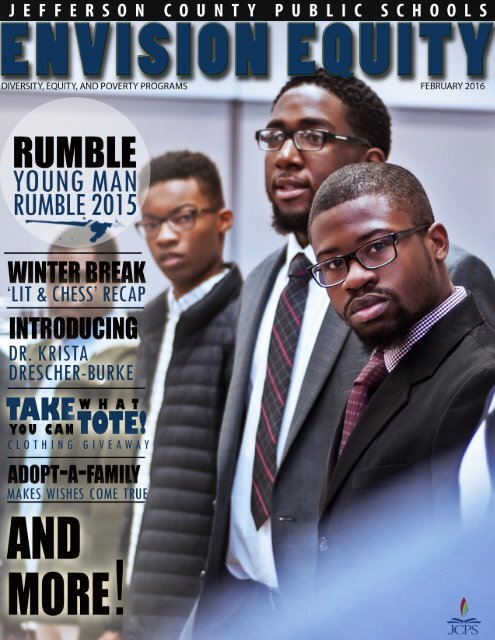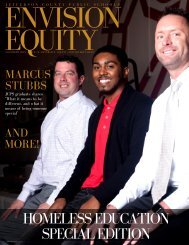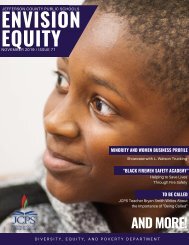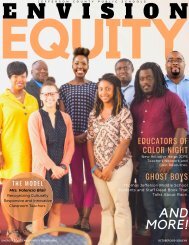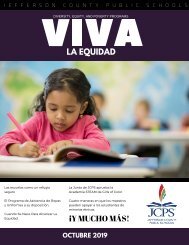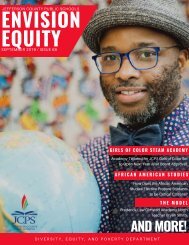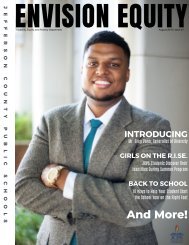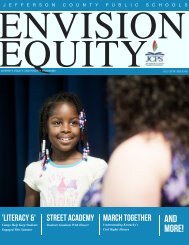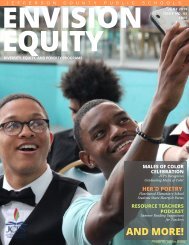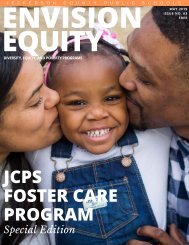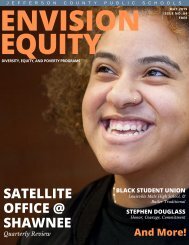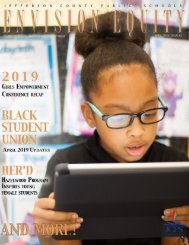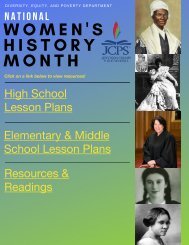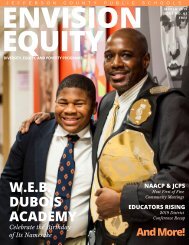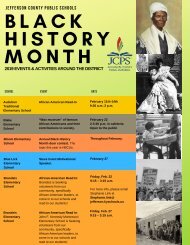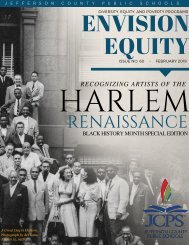ENVISION EQUITY FEBRUARY 2016
You also want an ePaper? Increase the reach of your titles
YUMPU automatically turns print PDFs into web optimized ePapers that Google loves.
1
Envision Equity<br />
<strong>FEBRUARY</strong> <strong>2016</strong><br />
From left, a student speaks during a group discussion at the Ali<br />
Center; community organizations receive grants at the Black Male<br />
Achievement breakfast; a student writes a reflection during a group<br />
activity at the Ali Center. (Photos, Abdul Sharif)<br />
Rumble Young Man, Rumble:<br />
City of Louisville Stands Up for Black Male Achievement<br />
By Daryle W. Unseld Jr.—Senior Manager, Community Engagement, Metro United Way<br />
Black Male Achievement can be described as a national<br />
movement to improve outcomes for ALL communities<br />
by addressing persistent opportunity gaps facing African<br />
American males.<br />
Several months ago Metro United Way chartered new territory<br />
by developing a Black Male Achievement (BMA) Initiative and<br />
creating a Black Male Achievement Innovation Fund. The<br />
purpose was explicitly related to addressing the reality of the<br />
local, human-condition truths affecting black males in our<br />
community.<br />
Metro United Way issued a request for proposals and,<br />
ultimately, selected 10 grassroots organizations that may lack<br />
infrastructure but demonstrate strong results in serving black<br />
boys and young men in our community. Metro United Way is<br />
focused on investing at the grassroots level for this initiative. It is<br />
a key strategy in building a more robust leadership pipeline,<br />
while also cultivating a new cohort of leaders at the local level<br />
supporting Black Male Achievement.<br />
To commemorate the launch of the Black Male Achievement<br />
Initiative and grants, Metro United Way hosted a community<br />
conversation called Quantifying Hope and Celebrating<br />
Achievement last month. The event featured Shawn Dove, CEO<br />
of the Campaign for Black Male Achievement (CBMA).<br />
Shawn leads CBMA, a national membership network committed<br />
to improving the life outcomes of black men and boys. He<br />
shared his expert insight regarding opportunities to utilize<br />
collective action and inclusive strategies to ensure black boys<br />
and young men have their basic needs met, a quality education<br />
and sufficient employment opportunities.<br />
Recipients of the first ever Black Male Achievement Innovation<br />
Awards from Metro United Way are:<br />
1. 2 Not 1<br />
2. 10 th Street Cardinals<br />
3. Academy of Music Production Education and<br />
Development<br />
4. Elevate Recreation<br />
5. First Gethsemane Child Care Development Center<br />
6. Highland Park Community Development Corporation<br />
7. KY National Black MBA Association<br />
8. Salt & Light Community Development Corporation<br />
9. Spread Love Enterprise<br />
10. St George’s Scholar Institute<br />
Metro United Way will be working with these organizations over<br />
the next 12 months to assist with capacity building and, more<br />
importantly, gain new insights to support the BMA movement.<br />
This collaborative initiative is drawing national attention within<br />
the United Way Worldwide network - because United Way<br />
envisions a world where every individual has an opportunity to<br />
succeed and entire communities thrive as a result.<br />
2
Envision Equity<br />
<strong>FEBRUARY</strong> <strong>2016</strong><br />
The YMCA Childcare Enrichment Program<br />
Students Practice Competing Through the Literacy and Chess Program<br />
Over the Winter Break!<br />
By Chrystal Hawkins—Resource Teacher, Diversity, Equity, and Poverty Programs<br />
From left, students put their chess skills to the test during a<br />
friendly game at Kennedy Montessori; students displays their<br />
chess certificates during a closing ceremony at Kennedy<br />
Montessori. (Photos, Abdul Sharif)<br />
We are so excited to have<br />
kicked off our first Literacy &<br />
Chess/Childcare Enrichment<br />
Program (CEP) Partnership<br />
program over the winter break at the<br />
Klondike, Zachary Taylor<br />
and Kennedy Montessori<br />
Elementary CEP sites!<br />
Knowing the<br />
YMCA is<br />
dedicated to<br />
keeping kids<br />
interested<br />
while having<br />
fun with<br />
imaginative<br />
academic<br />
activities and<br />
improving<br />
literacy, we<br />
Above, a student completes a literacy assignment during<br />
Literacy & Chess at Kennedy Montessori.<br />
knew this partnership would be a Win-<br />
Win!<br />
Student participants who resided in or had<br />
parents employed in the CEP site area<br />
were initially cautious about spending their<br />
winter break ‘in school.’ However, once<br />
students connected what they were<br />
learning to their chess lessons and<br />
matches through the Literacy & Chess<br />
program, the competition was on!<br />
Students focused on gaining skills<br />
necessary to beat their competitor on and<br />
off the chess board and understanding<br />
characters who like them, had to<br />
persevere and try again even when they<br />
didn’t always win.<br />
The Literacy and Chess Program is a<br />
standards-based program designed to<br />
expose students to<br />
character-building<br />
activities while<br />
receiving<br />
connected literacy<br />
instruction from<br />
certified JCPS<br />
teachers,<br />
instructional<br />
assistants and<br />
activity-related<br />
instructors like<br />
chess coaches. Each day, the program<br />
begins with written reflection and<br />
discussion of goals, competition,<br />
perseverance and other character<br />
development themes. Students then learn<br />
and practice a standards-based skill while<br />
reading the program’s anchor text.<br />
Afterwards, students receive instruction<br />
from a master coach connected with the<br />
program’s activity, chess.<br />
The magic happens when students relate<br />
character development themes to the<br />
anchor text of the program and to the<br />
activity they will participate in during the<br />
program. Like Chess and Literacy, each<br />
program uses an anchor text with<br />
characters that the students can relate to.<br />
Often, the main character of the anchor<br />
text will experience some of the same<br />
feelings of anxiety, fear and lack of<br />
confidence in mastering the same activity<br />
students are learning like chess, in this<br />
case. Like the main characters, as<br />
students practice new literacy skills and<br />
learn new strategies from activity coaches,<br />
they also gain confidence and skills<br />
necessary to master and overcome a final<br />
competition, a final literacy assessment or<br />
any challenge or barrier life may throw<br />
their way!<br />
As a result of the Literacy and Chess<br />
Program, students now own their very<br />
own chess set, a book with a character<br />
they can relate to and most of all,<br />
strategies that will help them master<br />
chess, literacy and life.<br />
For more information about the Literacy<br />
and Chess Programs, contact Chrystal<br />
Hawkins at 502-485-3650.<br />
3
Envision Equity<br />
<strong>FEBRUARY</strong> <strong>2016</strong><br />
Take What You Can Tote: JCPS<br />
Gives Back When Needed Most<br />
By Heather Wampler,<br />
President 15th District PTA<br />
On Saturday, December 12, 2015, the 15th District Parent<br />
Teacher Association (PTA) and Jefferson County Public<br />
Schools (JCPS) hosted the second annual Take What You<br />
Can Tote clothing giveaway event. Each year, adults from across the<br />
community are invited to the Clothing Assistance Program (CAP)<br />
building to select gently used clothing for their children, other members<br />
of their family, and themselves. This annual holiday event is made<br />
possible through the generous donations of local PTA clothing drives,<br />
community individuals, churches, and civic and social organizations.<br />
This year, nearly 700<br />
families participated in<br />
the event, and more<br />
than 50 community<br />
volunteers—including<br />
Dr. and Mr. Hargens<br />
and members of the<br />
National Pan Hellenic<br />
Council’s Divine 9<br />
organizations—were<br />
on hand to ensure that<br />
families had the best<br />
shopping experience<br />
possible. An event of<br />
this magnitude would<br />
never be possible<br />
without the<br />
community’s clothing donations and the help of our community<br />
volunteers.<br />
From left,, families wait in line at the CAP office during Take What<br />
You Can Tote. (Photo, Abdul Sharif)<br />
CAP provides new uniforms and gently used clothing to district families,<br />
by appointment, throughout the year. Families needing assistance<br />
should contact their child’s Family Resource and Youth Services Center<br />
(FRYSC) coordinator to make an appointment.<br />
From left, volunteers from Omega Psi Phi and Alpha Kappa Alpha<br />
prepare clothing during Take What You Can Tote; families receive<br />
resources from community organizations during Take What You<br />
Can Tote. (Photo, Abdul Sharif)<br />
4
Envision Equity<br />
<strong>FEBRUARY</strong> <strong>2016</strong><br />
UNDERSTANDING POVERTY<br />
By Dr. Monica Lakhwani—JPCS Equity and Inclusion Unit<br />
A row of vacant homes in the California neighborhood near<br />
Johnson Traditional Middle School. (Photo, Abdul Sharif)<br />
The United States government<br />
defines poverty based on specific<br />
income levels. Poverty guidelines vary<br />
depending on the number of persons in a<br />
household. Based on the Department of<br />
Health and Human Services (HHS), the<br />
graphic on the right, lists a sample of the<br />
2015 poverty guidelines for 48 states<br />
inclusive of Kentucky.<br />
The definition of poverty further rests on<br />
whether one looks at it from a cultural<br />
perspective or from a needs perspective.<br />
The former includes but is not limited to the<br />
lack of access to a quality education, rich<br />
experiences, nutritious food and preventive<br />
healthcare, basic knowledge of life skills,<br />
and effective social skills. The latter<br />
incorporates lack of food, clothing, shelter,<br />
and medical care.<br />
Understanding poverty is essential for<br />
educators for various reasons:<br />
• Economic instability and concentrated<br />
poverty impacts academic, social, and<br />
economic outcomes<br />
• Students’ cultural and social environment<br />
can lead to the adaptation of instructional<br />
practices and strategies in the classroom<br />
• Awareness creates<br />
opportunities in providing<br />
equitable access,<br />
increasing steps towards<br />
cultural proficiency, and in<br />
being inclusive and<br />
respectful<br />
Facts<br />
Kentucky has the fifth largest<br />
poverty rate in the nation with<br />
19.4 percent of individuals<br />
living in poverty (approximately<br />
823,000), far exceeding the<br />
national poverty rate. Similarly,<br />
the percentage of children in<br />
Kentucky under the age of 18<br />
living in poverty (26.2 percent)<br />
exceeds the national average<br />
(21.7 percent). Further, 16.7<br />
percent of families residing in<br />
Jefferson County live below the<br />
poverty line. Listed below are<br />
a few facts specific to<br />
Jefferson County Public<br />
Schools (JCPS).<br />
• JCPS defines poverty based<br />
on those who qualify for<br />
free/reduced meals<br />
Persons in<br />
Family/<br />
Household<br />
Poverty<br />
Guideline<br />
$11,770<br />
$15,930<br />
$20.090<br />
$24,250<br />
$28,410<br />
$32,570<br />
$36,730<br />
Continued on next page.<br />
5
Envision Equity<br />
<strong>FEBRUARY</strong> <strong>2016</strong><br />
• There is an unequal distribution of poverty concentration in<br />
JCPS schools<br />
• The majority of JCPS mainstream schools (82 out of 133)<br />
have higher levels of poverty than the district average<br />
• At least 2 out of every 5 students in your classroom may be<br />
living in a high-poverty area<br />
• Poverty, race, and schooling are very highly correlated with<br />
location<br />
Types of Poverty<br />
Situational – lack of resources due to environmental disasters,<br />
severe illness, or divorce<br />
Generational – lack of resources/tools for families in poverty<br />
for a minimum of two generations<br />
Absolute – lack of basic needs met such as shelter, water,<br />
food<br />
Relative – lack of income relating to the average standard of<br />
living<br />
Urban – lack of adequate services and complicated by layers<br />
of stress as a result of violence and crowding<br />
Rural – lack of adequate access to services (i.e. education,<br />
job opportunities, support)<br />
Engagement Strategies<br />
There is no single solution to poverty. Often what does not<br />
work includes delivering top-down lectures, increasing<br />
discipline, decreasing interaction among students, and<br />
eliminating or reduction of arts/physical activity. Nevertheless,<br />
as educators we can continue learning so we can positively<br />
impact our students lives. In working with students who come<br />
from poverty, incorporate movement, ask more questions,<br />
appreciate every response, use demonstrations and visuals,<br />
and continue to be passionate about the topic taught!<br />
References<br />
Banks, J. (2001). Cultural diversity and education. Boston,<br />
MA: Allyn and Beacon.<br />
JCPS Equity Scorecard - http://www.jefferson.kyschools.us/<br />
Programs/mcconnections/EquityScorecard/<br />
Jensen, E. (2009). Teaching with poverty in mind: What being<br />
poor does to kids' brains and what schools can do about it.<br />
Alexandria, Va: ASCD.<br />
Kozol, J. (1991). Savage inequalities. New York, NY: Harper<br />
Collins.<br />
U.S. Census Bureau. (2014). PERCENT OF CHILDREN<br />
UNDER 18 YEARS BELOW POVERTY LEVEL IN THE PAST<br />
12 MONTHS (FOR WHOM POVERTY STATUS IS<br />
DETERMINED) - United States. American Community<br />
Survey 1-Year Estimates.<br />
U.S. Census Bureau. (2013). Poverty: 2000-2012, American<br />
Community Survey Briefs. Retrieved from http://<br />
www.census.gov/prod/2013pubs/acsbr12-01.pdf.<br />
U.S. Census Bureau. (2014). State & county quickfacts:<br />
Jefferson County, KY. Retrieved from http://<br />
quickfacts.census.gov.<br />
U.S. Department of Health & Human Services. (2015). 2015<br />
Poverty Guidelines. Retrieved from http://aspe.hhs.gov/<br />
2015-poverty-guidelines.<br />
JCPS AND BUSINESS DIVERSITY<br />
By Carl Ledford—JCPS Equity and Inclusion Unit<br />
Carey L. Anderson (Photo, www.boa.ky.gov)<br />
Adiverse supplier base adds value through a broadened reserve of<br />
experience, perspective and talent. New ideas are generated from a broader<br />
and more diverse supplier base of goods and services. JCPS has emphasized<br />
supplier diversity for many years and has fostered long term relationships with a broad<br />
base of Women and Minority Owned businesses. Women and Minority Businesses<br />
represent the fastest growing portion of small business and reflect the fact that the US<br />
Census Bureau estimates 90% of the US population growth thru 2050 will be Minorities<br />
arriving from abroad and though US births. Envision Equity, will highlight some of the<br />
outstanding Women and Minority suppliers of Goods and Services to JCPS.<br />
It is only appropriate to begin our series with one of the District’s most outstanding<br />
Architects Carey L. Anderson, Jr., of C. L. Anderson Architecture, LLC. Mr. Anderson is the company’s principal. In<br />
this position, he administers and manages a team of architects, engineers and computer drafters comprising the<br />
‘design team’ for the commissioned projects within the firm. Carey has designed various types of facilities from<br />
recreational, institutional, educational and religious.<br />
Continued on next page.<br />
6
Envision Equity<br />
<strong>FEBRUARY</strong> <strong>2016</strong><br />
A Louisville native, Carey attended the Jefferson County Public School system, graduating from DuPont Manual High<br />
School in 1968. He entered the University of Kentucky and earned his Bachelor of Architecture degree in 1973 as the<br />
first African-American to graduate from the University of Kentucky College Of Architecture. He has been in private<br />
practice since 1980.<br />
Of the many projects that Carey has designed,<br />
the following are just a few of the Jefferson County<br />
Public School projects his firm has completed<br />
over the years:<br />
• Atkinson Elementary School<br />
• Newburg Middle School<br />
• Farnsley Middle School<br />
• Unseld Pre-School Education Center<br />
• Byck Elementary School Media Center and<br />
Gymnasium Addition<br />
• Englehard Elementary School Classrooms<br />
and Media Center Addition<br />
• Dunn Elementary School Media Center<br />
Addition<br />
• Rutherford Elementary School Media Center<br />
Addition<br />
• Central High School Athletic Stadium<br />
The recently renovated Media Center at Rutherford.<br />
Elementary School (Photo, www.lichtefeldinc.com)<br />
Carey has remained actively involved in his profession and community during his many years in practice, serving on<br />
the boards of the Louisville Urban League, Private Industry Council, Louisville Landmarks Commission, Kentucky<br />
Board of Architects, Kentucky Historic Properties Advisory Commission and the Louisville Metro Board of Zoning<br />
Adjustment. He is a member of the Council of Educational Facility Planners International (CEFPI) and the American<br />
Institute of Architects (AIA) and holds licenses as a registered Architect in Kentucky and Indiana.<br />
Carey and his wife Karen, also a Louisville native and a middle school counselor in the Jefferson County Public School<br />
system, have been married for 40 years and have an adult daughter, Latrice Anderson, a registered nurse.<br />
EXPLORING NATIVE AMERICAN CULTURES<br />
AT SHACKLETTE ELEMENTARY<br />
By Amos Wilkins, ESL Teacher, Shacklette Elementary<br />
Darrell Anthony assists Ben Kelley with his<br />
Blackfoot Indian project. (Photo, Amos Wilkins)<br />
As Thanksgiving<br />
celebrations<br />
neared, festive presentation<br />
boards and homemade<br />
models of Native American<br />
housing began to clutter up<br />
Ms. Dee Smith’s 5 th grade<br />
Social Studies room. These<br />
Shacklette students had<br />
fought chilly rainfall and the hustle of morning arrival to<br />
protect their special projects from any damage. In Ms.<br />
Smith’s class, students presented key details about the<br />
history and culture of different Native American tribes.<br />
Many students were anxious for their moment to shine<br />
before their friends. First, Krista Carta demonstrated the<br />
style of Seneca tribe longhouses through her construction<br />
paper model. Ethan Brown showed pictures of Anasazi<br />
dream catchers of beads and rocks, a spiritual tool to<br />
entrap one’s bad dreams and burn them before they come<br />
true. Another student re-enacted an Iroquois parenting<br />
technique of scaring disobedient children by surprising the<br />
naughty child with a sibling wearing a mask--her mother<br />
even tried this out with her the previous weekend!<br />
Later, Shacklette students reflected on their study of<br />
culture and made some deep connections on how culture<br />
works in their real lives. Jennifer Chen explained, “Culture<br />
describes how other people are like, their family history,<br />
and how they are special in their own way.” A classmate<br />
added, “Knowing about someone’s culture is important<br />
because if you meet them, you will know something about<br />
them so you won’t judge them.”<br />
Continued on next page.<br />
7
Gabby Rodriguez explains her Tillamook teepee<br />
models. (Photo, Amos Wilkins)<br />
These 5 th<br />
graders then<br />
began reflecting<br />
on their own<br />
family’s culture.<br />
Krista pointed to<br />
her family’s love<br />
of the holidays<br />
such as<br />
Christmas and<br />
Easter. Gabby<br />
Rodriguez<br />
shared some<br />
aspects of her<br />
Puerto Rican culture, “Boxing is big with my dad. And for<br />
Puerto Ricans the elephant is important. If the trunk is up, it<br />
means good luck. If the trunk is down, it’s bad.” Jennifer<br />
shared about how the Chinese New Year is a time to be<br />
happy, and it was important to show respect to all the family<br />
members that come over. “Even if they are sometimes<br />
mean,” she added.<br />
INTRODUCING<br />
Dr. Krista Drescher-Burke, Community Data Specialist<br />
Diversity, Equity, and Poverty Programs<br />
For them, culture<br />
also meant<br />
understanding<br />
the community<br />
that staff and<br />
students are<br />
building at<br />
Shacklette.<br />
Culture at<br />
Shacklette means<br />
students “Riding<br />
Justice Goode shares her Navajo Nation project<br />
with classmates Kimberly Minor, Paul Butler, and<br />
Brianna Geary. (Photo, Amos Wilkins)<br />
the Wave” for best behavior expectations and teachers<br />
finding the best way to reach students so they can learn.<br />
Jennifer Chen revealed, “Everyone is special and different<br />
at Shacklette. We show respect and take care of our<br />
responsibilities. There are programs here that help every<br />
student learn in a different way.” Ms. Smith’s classes’<br />
presentation boards and models are now on display in the<br />
Shacklette Library, sparking many conversations about<br />
culture, past and present alike.<br />
As the Community Data Specialist in Diversity, Equity, and Poverty (DEP) Programs,<br />
my first priority will be to evaluate the effectiveness of out-of-school-time (OST)<br />
programs in improving the academic, behavioral, and attendance outcomes of participants.<br />
Further, I will explore the extent to which OST programs are accessible to our most<br />
disadvantaged students. Working closely with the Research and Data Management team, I<br />
will assign a grade to each OST program based on how well they are improving student<br />
outcomes, and I will provide support as needed to OST programs who are expanding<br />
student tracking or may be beginners in data collection.<br />
However, there are challenges, the most significant being OST provider involvement in<br />
student tracking. Before we can do any meaningful evaluation of programs, OST providers<br />
must see the benefit to tracking student outcomes via CASCADE, and then commit to doing<br />
it reliably. I will provide CASCADE training to providers, visit their agencies, discuss<br />
challenges to student tracking, and strategize with providers the best solutions for how to<br />
track student progress. In general, I will be the point person for OST providers, many of<br />
whom will be collecting student data for the first time. Only after we have OST provider buyin<br />
will we be able to reliably track their effectiveness for our students and assign a grade.<br />
A parent or guardian of each OST program participant signs a waiver allowing his or her<br />
student’s information to be shared with JCPS, and all formal OST providers agree to share<br />
data with JCPS. After we have greater participation among OST providers, we will be able<br />
to link OST participation at specific programs with student performance, hence evaluating<br />
how well OST programs are meeting the needs of students.<br />
OST program grades will be determined by a rubric, which will be developed with input<br />
from both OST program leaders and from the philanthropic community, who fund a large<br />
share of local OST programs. The grading process will benefit OST providers and funders<br />
alike. OST programs will be aware of how they will be evaluated and will be able to reliably<br />
track their impact in areas funders are most interested in supporting. Funders will be able to<br />
more optimally direct their giving to programs that are doing the best work in areas they<br />
prioritize. Successful programs will be supported as they expand capacity, and ultimately<br />
our JCPS students will benefit.<br />
8<br />
Photo, Abdul Sharif
Envision Equity<br />
<strong>FEBRUARY</strong> <strong>2016</strong><br />
Big Brothers Big Sisters’<br />
School to Work Initiative<br />
I<br />
n a partnership with Jefferson<br />
County Public Schools, Big<br />
Brothers Big Sisters (BBBS)<br />
launched the School to Work<br />
workplace mentoring initiative during the<br />
2014-2015 school year with scholars<br />
from Seneca High School and “Bigs”<br />
from Humana and<br />
PricewaterhouseCoopers (PWC). This<br />
program is an innovative approach to 1-<br />
to-1 mentoring. Students today face<br />
numerous challenges and many youth in<br />
our community leave school lacking the<br />
basic employability skills for available<br />
positions in the workplace. School to<br />
Work offers a unique way to tackle these<br />
issues by providing students the benefits<br />
of career path goal-setting, soft skill<br />
development and motivation to graduate<br />
with the added support of a 1-to-1<br />
friendship.<br />
How Does It Work?<br />
• Corporate partners provide resources<br />
via funding and volunteer mentors<br />
• Scholars are matched with employee<br />
volunteers in professionally-supported<br />
1-to-1 mentoring relationships<br />
facilitated by Big Brothers Big Sisters<br />
staff<br />
• Employees mentor Scholars once a<br />
month for two hours on-site at the<br />
workplace with a specific curriculum<br />
provided by BBBS staff and partners<br />
• Scholars gain valuable exposure to<br />
workplace skills and career<br />
opportunities, and are inspired to<br />
envision and achieve a brighter future<br />
• Annual impact reports collect<br />
outcomes and track success of<br />
participants<br />
Outcomes collected from Year 1 of<br />
School to Work highlight the<br />
effectiveness and need for the<br />
program in our community.<br />
Photo, www.bigbrobigsis.com.<br />
Of Scholars enrolled:<br />
• 80% showed improvements in the<br />
area of educational expectations,<br />
meaning that they had positive<br />
perceptions about their likelihood of<br />
finishing high school, going to college<br />
and finishing college<br />
• 100% showed improvements in the<br />
area of special adults, meaning they<br />
have special adults, other than<br />
parents/guardians, that spend time<br />
with them, encourage them to do their<br />
best, who care about them and who<br />
influence their decisions<br />
• 92% avoided suspension or<br />
decreased suspension rates from the<br />
prior year<br />
Of employee mentors enrolled:<br />
• 100% agree that they are proud that<br />
their company supports volunteer<br />
programs<br />
By Stephanie White—Community Engagement Director,<br />
Big Brothers Big Sisters of Kentuckiana<br />
Employees mentor<br />
Scholars once a month for<br />
two hours on-site at the<br />
workplace with a specific<br />
curriculum provided by<br />
BBBS staff and partners<br />
Stephanie White—Community<br />
Engagement Director,<br />
Big Brothers Big Sisters of<br />
Kentuckiana<br />
• 92% strongly agree that being a<br />
mentor has given them a better<br />
understanding of the social challenges<br />
faced by their community<br />
• 100% agree that School to Work is a<br />
great way for their company to invest<br />
in the community<br />
During the current 2015-<strong>2016</strong> school<br />
year, the School to Work initiative will<br />
grow by over 400% and by the end of<br />
the year, over 80 area scholars from<br />
Seneca High School, Southern High<br />
School and The Academy at Shawnee<br />
will benefit from the additional support a<br />
mentor from offers along with a wrap<br />
around monthly curriculum and<br />
workplaces visits School to Work<br />
provides. Our workplace partners are:<br />
Humana, PriceWaterhouseCoopers,<br />
LG&E KU, Louisville Metro Government,<br />
Republic Bank and Hilliard Lyons.<br />
For more information about Big Brothers<br />
Big Sisters of Kentuckiana’s innovative<br />
programs, visit www.bbbsky.org.<br />
9
Envision Equity<br />
<strong>FEBRUARY</strong> <strong>2016</strong><br />
JCPS Males of Color Pledge<br />
By Dr. Marco A. Munoz—JCPS Director of Priority Schools<br />
Jefferson County Public Schools (JCPS) takes great<br />
pride in its diverse student population. Joining forces<br />
with 60 school districts that are associated with the<br />
Council for Great City Schools (CGCS), JCPS has<br />
made a pledge for supporting the education of males of<br />
color. The Males of Color Pledge involves about 26,300<br />
students enrolled in JCPS.<br />
Despite making academic gains for all demographic groups<br />
as noted on the JCPS 2013-14 statewide assessment<br />
results, it is quite evident that we still have room for growth.<br />
The progress has been incremental, but what is needed is<br />
substantial growth. We want all JCPS students to reach<br />
proficiency.<br />
The current state of the district data shows that African-<br />
American males are overrepresented in suspension rates<br />
and retention rates while Latino males are overrepresented<br />
in dropout rates.<br />
In terms of academic data, only about one out of four<br />
African-American male students is proficient in core<br />
subjects. We need to figure out innovative solutions, and<br />
we had better implement them soon.<br />
We need the entire Louisville community to engage with<br />
JCPS to succeed. It is a moral imperative for all. We can<br />
make improvements only if we all commit to slaying<br />
inequities in our educational system.<br />
IN<strong>EQUITY</strong> DATA<br />
(2013-14)<br />
Suspension rate: 16% for African-<br />
American males<br />
Retention rate: 6.7% for African-<br />
American males<br />
Dropout rate: 6% for Latinos/<br />
Hispanic males<br />
Proficient/Distinguished in<br />
combined reading and math for<br />
grades 3 through 8: 25% for African-<br />
American males<br />
Proficient/Distinguished in high<br />
school Algebra II: 21% for African-<br />
American males<br />
Proficient/Distinguished in high<br />
school English II: 25.2% for African-<br />
American males<br />
Advanced Placement examinations:<br />
6.6% for African-American males<br />
Photo, Abdul Sharif.<br />
10
Envision Equity<br />
<strong>FEBRUARY</strong> <strong>2016</strong><br />
Value and Celebrate Cultural Diversity in Schools<br />
We often forget how rich our district is and how it can continue to be, especially when we integrate the cultures our students have to<br />
offer. Why is it important to value and celebrate cultural diversity in schools? Here are some responses to this question from JCPS<br />
staff:<br />
Cultural diversity should be celebrated in our<br />
schools because it is a cornerstone of our nation.<br />
We are a nation of immigrants and refugees who<br />
have sought and found freedom in America. As<br />
our schools value that heritage and welcome new<br />
expressions of cultures, we are remembering our<br />
own roots and celebrating that all people are<br />
significant and valuable. We are inviting the next<br />
generation to celebrate the freedom and diversity<br />
that have made our nation great.<br />
—Rosalyn Bertles, Teacher Educator<br />
ESL Newcomer Academy<br />
Topics of cultural diversity can be<br />
some of the most difficult for people<br />
to discuss and understand.<br />
Celebrating various human<br />
differences with students<br />
familiarizes them with those topics<br />
early in life so that they are better<br />
prepared to have these discussions<br />
and encounter issues of diversity in<br />
a healthy way.<br />
—Erin Parry, Instructor III<br />
Semple Elementary<br />
In order to prepare our students for the real world, we<br />
need to teach them to embrace diversity and cultural<br />
differences. The professional world is very diverse, and<br />
the more experience our students have, either firsthand<br />
or through teaching, the better prepared they will be.<br />
—Jessie Newhouse, Teacher Educator<br />
Southern High<br />
If we celebrate our differences, we can capitalize<br />
on our strengths without diminishing each other.<br />
—Norah Wakefield, Teacher Educator<br />
Brown School<br />
Nothing strengthens our identity as Americans<br />
more than embracing diversity. Cultural<br />
diversity gives our community flavor. Looking at<br />
the world through the lenses of other cultures<br />
allows us to find strength in our own convictions<br />
and beauty in the convictions of our neighbors.<br />
—Eric Bookstrom, Teacher Educator<br />
The Academy @ Shawnee<br />
It is important to celebrate diversity in schools. By<br />
celebrating diversity, it allows both students and<br />
staff to get connected to one another. It also will<br />
make students feel valued. The most important<br />
part about celebrating diversity is building<br />
relationships throughout our school district.<br />
—Tenesha Marshall, Counselor<br />
Liberty High<br />
Celebrating the cultural diversity in schools helps<br />
us build upon the strengths that each student,<br />
faculty member, and parent brings into our<br />
community. By encouraging, celebrating, and<br />
embracing the cultural diversity that each person<br />
adds to the world, we learn just how valuable<br />
each is.<br />
—Michelle Sircy, Specialist II<br />
Academic Support Programs<br />
All students come to us with a unique cultural self. By<br />
celebrating the rich array of diversity reflected within each<br />
individual, we enhance our students’ ability to celebrate<br />
themselves and the unique gifts they have to offer the school<br />
community and the wider world.<br />
—Judi Vanderhaar, Specialist II, Data Management<br />
For me, diversity is truth—the earnest<br />
acceptance of one who is different.<br />
—Carl Ledford, Manager<br />
JCPS Equity and Inclusion Unit<br />
School-age children have an innate<br />
ability to believe everyone is awesome,<br />
no matter their similarities or<br />
differences. Celebrating cultural<br />
diversity is about valuing others’<br />
differences.<br />
—LaRae Whitely, Principal<br />
Camp Taylor Elementary<br />
11
Envision Equity<br />
<strong>FEBRUARY</strong> <strong>2016</strong><br />
2015 Adopt-A-Family, Makes Wishes Come True<br />
By Julie McCullough—JCPS Department of Student Equity and Community Engagement.<br />
From left, Julie McCullough places a banner on the wall during the<br />
2015 Adopt-a-Family event; wrapped gifts await families during the<br />
2015 Adopt-a-Family event. (Photos, Abdul Sharif)<br />
Adopt a Family—that was the name used to describe<br />
the primary holiday program headed up by the<br />
Department of Student Equity and Community<br />
Engagement (formerly known as the Department of<br />
Homeless Education). The initial idea for the program began in<br />
October of this past year. A family had fallen on hard times.<br />
The children’s mother was not sure she would be able to<br />
obtain Halloween costumes for her children, let alone<br />
Christmas presents. She had tried to sign her<br />
children up for an Angel Tree program<br />
but found out it was already too late.<br />
She contacted our office in tears.<br />
Christy Ward, one of our office<br />
staff, had the idea to find a<br />
family or church that would<br />
sponsor this young family for<br />
the holidays. This one spark<br />
of an idea created the<br />
Above, a student thanks Giselle Danger, Coordinator of the JCPS<br />
Department of Student Equity and Community Engagement.(Photo,<br />
Abdul Sharif)<br />
momentum for an entire<br />
holiday program.<br />
It became the goal of our department to ensure that our<br />
families most in need would not go without gifts for the<br />
holidays. The idea was to link families in need with donor<br />
families from JCPS staff and the Louisville community. In the<br />
end, 42 families and youth received gifts, meals, or fun<br />
activities to participate in. Twenty-five of the donors consisted<br />
of JCPS staff and local families. In addition, the corporate<br />
office from Texas Roadhouse provided gifts for three of our<br />
largest families, including bunk beds and air mattresses for a<br />
family with no furniture. The Jefferson County Association of<br />
School Administrators (JCASA) was one of our largest donors,<br />
providing gifts for seven families and youth, a total of 20<br />
students. JCASA also provided pizza and dessert for our<br />
holiday celebration on December 18. This culmination event<br />
took place at duPont Manual High School. During the evening<br />
of celebration, families received gifts, children got to meet<br />
Santa, and several families even had the opportunity to meet<br />
their donors.<br />
Above, volunteers await families at the 2015 Adopt-a-<br />
Family event. (Photo, Abdul Sharif)<br />
The Adopt a Family program<br />
alone may have been enough<br />
to make the holiday special,<br />
but many children<br />
experiencing homelessness<br />
or poverty would not have<br />
the opportunity to experience<br />
the joyous activities other<br />
children might take part in<br />
over winter break. As a result, we are incredibly grateful to the<br />
multitude of local businesses and corporations that provided<br />
meals or adventures for students experiencing homelessness<br />
over the holidays. Donors included the Grape Leaf Restaurant,<br />
King Fish Grill, Graeter’s Ice Cream, Hard Rock Café,<br />
Cheesecake Factory, Alpine Ice Arena, Iceland Sports<br />
Complex, House of Boom, Sky Zone, KFC Yum! Center, King<br />
Pin Lanes, Derby Dinner Playhouse, Actors Theatre, and<br />
Newport Aquarium. Lazer Blaze also demonstrated an<br />
incredible amount of generosity, allowing 20 children from local<br />
shelters and their parents to participate in a round of laser tag<br />
at no cost to the shelters, JCPS, or the families. We cannot<br />
thank these businesses enough for their willingness to make<br />
the holidays special for children and families this past holiday<br />
season.<br />
As a result of the generosity of donors from both JCPS and the<br />
Louisville community, numerous students and families<br />
struggling this past year experienced the joy and excitement of<br />
the holidays. Thank you for your crucial support. We hope to<br />
make next year even better for these families.<br />
12
Envision Equity<br />
<strong>FEBRUARY</strong> <strong>2016</strong><br />
Culturally Responsive Dyads Present at National Conference<br />
By Kathryn Whitmore and Emily Zuccaro—University of Louisville<br />
JCPS teachers Shashray McCormack (kindergarten, Mill Creek Elementary) and Janelle Henderson (second grade,<br />
Atkinson Academy) continue their work with University of Louisville faculty members Kathryn F. Whitmore and Tasha<br />
Laman Tropp in creating a culturally responsive curriculum through the Professional Dyads and Culturally Relevant<br />
Teaching program, sponsored by the Early Childhood Education Assembly of the National Council of Teachers of<br />
English.<br />
The team worked with other dyads from across the country at the National Council of Teachers of English conference in<br />
Minneapolis, Minnesota in November. At the conference the JCPS dyads presented their initial culturally responsive<br />
teaching projects that had been implemented in McCormack’s and Henderson’s classrooms.<br />
At Mill Creek Elementary, kindergartners explored babies and the significance of their names, reading books such as Hope<br />
by Isabell Monk, She Come Bringing Me That Little Baby Girl by Eloise Greenfield, and Please, Baby, Please by Spike Lee<br />
and Tonya Lewis Lee. Kindergartners discovered the joy of telling their name origin stories in drawing and writing. At<br />
Atkinson Academy, second graders celebrated the beauty of their hair, learning from children’s picture books such as<br />
Happy to Be Nappy by Bell Hooks and Hair Dance by Dinah Johnson. The children shared their written hair stories at<br />
Family Literacy Night, connecting students, families, and books.<br />
Atkinson Academy second graders read culturally diverse children’s books and celebrated the beauty of their hair, learning from children’s picture books such as<br />
Happy to Be Nappy by Bell Hooks and Hair Dance by Dinah Johnson. Mill Creek Elementary students explored the world of babies and the significance of their name<br />
origins. The activities were part of a culturally responsive teaching project with the University of Louisville and the Professional Dyads and Culturally Relevant Teaching<br />
program. (Photos, Emily Zuccaro, University of Louisville)<br />
13
Envision Equity<br />
<strong>FEBRUARY</strong> <strong>2016</strong><br />
Minority Teacher Recruitment:<br />
Creating a Path for Future Educators of Color<br />
By Sylena Fishback—Diversity, Equity, and Poverty Programs<br />
From left, future teachers attend Minority Educator Recruitment<br />
Day at the VanHoose Education Center. (Photos, Abdul Sharif)<br />
There has been much concern over the shortage of<br />
minority teachers in Kentucky. Superintendents,<br />
administrators, and fellow educators have taken<br />
notice of the growing mismatch between the degree of racial/<br />
ethnic diversity in the student population and the degree of<br />
diversity in the teaching force. Jefferson County Public<br />
Schools (JCPS) of Louisville, Kentucky, has been intentional in<br />
its efforts to recruit and retain minority teachers. The district’s<br />
goal is for all schools to be staffed, resourced, and equipped<br />
to support student needs. One strategy for achieving this goal<br />
is to recruit and retain high-quality staff members who reflect<br />
the diversity of the student population.<br />
Above, Goldsmith Elementary Principal Jeremy Renner, conducts a<br />
mock interview at the 2015 Minority Educator Recruitment Day.<br />
(Photo, Abdul Sharif)<br />
On December<br />
10, 2015, the<br />
Diversity,<br />
Equity, and<br />
Poverty<br />
Department,<br />
Equity &<br />
Inclusion unit,<br />
hosted Minority<br />
Educator<br />
Recruitment Day! Interested MERR scholarship recipients of<br />
Kentucky and other minority teacher candidates spent the day<br />
in Louisville and JCPS. Potential candidates gained exposure<br />
to the fast paced experience of being in an urban school<br />
teacher and resident of Louisville. It was our hope to make<br />
JCPS and Louisville an attractive place to settle and grow.<br />
The objectives of this day were to increase the diversity of<br />
today’s teaching force in Kentucky public schools; to identify<br />
and recruit minority teacher candidates who will strive to<br />
incorporate the values, learning styles, and multiple cultural<br />
perspectives reflected in today’s public schools; and to recruit<br />
and support a diverse group of professionals seeking to begin<br />
their career in the field of education.<br />
JCPS values diversity in the classroom and would like to build<br />
an intentional relationship with minority teaching candidates in<br />
Kentucky and surrounding states. This event offered a<br />
professional experience that allowed potential teaching<br />
candidates to become familiar with the city of Louisville and<br />
the JCPS school district, strengthen their interview skills, and<br />
the candidates were able to become acquaintance with<br />
numerous JCPS Principals.<br />
Undoubtedly, JCPS is committed to recruiting and retaining<br />
minority educators. We recognize the importance of having a<br />
teaching force that reflects the student population. If you are<br />
interested in gaining more information pertaining to the<br />
Minority Educator Recruitment Program of JCPS please<br />
contact the office of Diversity, Equity, and Poverty at<br />
(502) 485-7967 or via email at<br />
sylena.fishback@jefferson.kyschool.us.<br />
14
Envision Equity<br />
<strong>FEBRUARY</strong> <strong>2016</strong><br />
Photo, Google Images.<br />
The Louisville Free Public Library United with<br />
JCPS to Support Students’ Success<br />
By Dr. Julie Scoskie—Director of Education and Outreach, Louisville Free Public Library<br />
The Louisville Free Public Library (LFPL) plays a big<br />
part in helping children in Jefferson County be<br />
successful in school. LFPL supports education by<br />
providing information for parents and additional tools children<br />
need to succeed. Supporting academic achievement for<br />
Louisville area residents is central to the mission. The Public<br />
Libraries United with Schools (PLUS) initiative formalizes this<br />
commitment to support individuals in their pursuit of learning.<br />
PLUS builds a strong foundation of academic support by<br />
collaborating with JCPS and other community organizations.<br />
Specifically, the<br />
LFPL provides:<br />
books for<br />
reading and<br />
research;<br />
resources on our<br />
website for every<br />
grade level;<br />
library staff at<br />
every location to<br />
provide<br />
homework<br />
support; and<br />
programs<br />
Photo, Louisville Free Public Library.<br />
throughout the<br />
year to help develop reading skills. Student Power Plus cards<br />
are now in the hands of nearly every student in Jefferson<br />
County, making it easier for kids to use all of the Library’s<br />
resources. Students are using them to check out nearly 1,000<br />
books per day! In addition, the Power Plus card also serves as<br />
a discount TARC pass.<br />
That’s not all. Research shows that reading and success in<br />
school go hand in hand. Your Library works with schools, day<br />
care centers and caregivers to help young children develop the<br />
habit of reading. The Library’s 1000 Books before Kindergarten<br />
Challenge encourages caregivers and their children, infant up<br />
to kindergarten, to encourage reading together. Young children<br />
like Zen who visited multiple library locations to find and read<br />
1,000 unique books to complete her challenge before<br />
Kindergarten, are entering school with a habit and love of<br />
reading.<br />
Speaking of school, going to kindergarten for the very first time<br />
is a really big deal! That’s why the Library partners with others<br />
to offer Kindergarten Countdown. In support of the JCPS 3 rd<br />
Grade Reading Pledge, the Library collaborated with Metro<br />
United Way and JCPS to provide every K-2 nd grade student<br />
their own book and encouraged them to enroll in the Share<br />
100 Stories before 4 th Grade. In addition, more than 51,000<br />
Cultural Passes were distributed this year largely through the<br />
Library, enabling families to enjoy cultural venues free this<br />
summer.<br />
The Library’s<br />
Summer Reading<br />
Program helped<br />
more than 30,500<br />
children and teens<br />
return to school<br />
better prepared to<br />
learn by<br />
encouraging them<br />
to read during the<br />
summer. Thanks<br />
to JCPS and<br />
Photo, Louisville Free Public Library.<br />
Continued on next page.<br />
15
other organizations that help the Library promote Summer<br />
Reading in our community, this was a record-breaking year!<br />
What about<br />
high school<br />
students<br />
preparing to<br />
go to college?<br />
The Library<br />
provides an<br />
array of<br />
resources to<br />
help all juniors<br />
Photo, Louisville Free Public Library.<br />
and seniors<br />
make the best<br />
possible score on their college entrance exams. Library staff<br />
teach classes on test-taking strategies for free. ACT study<br />
guides are available along with online practice exams at all<br />
locations. And the library partners with Kaplan to provide an<br />
actual ACT practice test for free at the Library.<br />
For teachers, the Library can help, too. Take advantage of<br />
online research databases, free class visits, bookmobile<br />
outreach services, book discussion kits, professional<br />
development and more. Our popular Teacher Collections are<br />
assembled around a particular theme or themes, for use in<br />
your classroom. Give us three weeks and we will customize<br />
your collection (up to 30 books) by fiction, nonfiction, subject,<br />
author, or any combination, for preschoolers through 8th<br />
grade. A collection can even be sent to the branch of your<br />
choice for easy pickup. Request a collection online at<br />
LFPL.org/teachers-collections.htm or by phone, (502)<br />
574-1620.<br />
The Library’s<br />
collaboration with<br />
KentuckianaWorks to<br />
offer Code Louisville,<br />
using the on-line<br />
learning platform<br />
Treehouse, is<br />
attracting national<br />
attention for<br />
Photo, Google Images.<br />
providing short-term<br />
training leading to<br />
high-wage positions in the technical sector. Lynda.com is also<br />
provided free with your library card, enabling individuals<br />
access to more than 3,900 training videos ranging from how<br />
to operate the newest iPhone to Microsoft training to How to<br />
Deal With a Difficult Boss.<br />
And if that isn’t already enough, College Short Courses, onetime<br />
Fast Classes, exhibits, and the Author Series provide<br />
additional reasons to visit your library. The Anne Frank family<br />
photo exhibit will be at the Main Library in January as well as<br />
courses and speakers related to the Holocaust and people<br />
who served in World War II. You won’t want to miss these<br />
opportunities and many others, so sign up today to receive<br />
the Library’s eNewsletter http://library.booksite.com/6416/<br />
signup/?list=NLSGN.<br />
Your library education partnerships offer a lifetime of<br />
learning opportunities for all Louisville residents!<br />
Together we are making a difference.<br />
Project Assistance Program at Stopher Elementary<br />
By Natalie Buente—Goal Clarity Coach, Stopher Elementary School<br />
Stopher Elementary strives to address the<br />
needs of all learners through a variety of<br />
programs, instructional methods, and<br />
materials. We have a strong parental<br />
support system that goes above and beyond<br />
to support our students. One of our many<br />
volunteer projects is the Project Assistance Program, developed by our teachers and administration.<br />
Through this program, parents donate their time to assist our at-risk population in completing long-term<br />
projects for the Science and Social Studies Fairs. These volunteers are assigned to a particular individual<br />
and come to Stopher one to two times a week to work on these projects. Many of our parents then attend<br />
the evening performances or judging events to show additional support for our students.<br />
Photo, Google Images.<br />
16
Envision Equity<br />
<strong>FEBRUARY</strong> <strong>2016</strong><br />
Winter Professional<br />
Development<br />
Department<br />
Title<br />
Session<br />
Code<br />
Date and Time Location Contact<br />
Equity and<br />
Inclusion<br />
Selma to<br />
Montgomery<br />
15-1674100 February 3<br />
4 to 6 p.m.<br />
Muhammad Ali<br />
Center<br />
(144 N 6th St,<br />
Louisville, KY)<br />
Equity and<br />
Inclusion<br />
485-7269<br />
Equity and<br />
Inclusion<br />
Book Study:<br />
Students in Poverty<br />
15-1672824 February 10, 17, and<br />
24 and March 2<br />
4 to 5 p.m.<br />
Gheens Academy<br />
Equity and<br />
Inclusion<br />
485-7269<br />
Equity and<br />
Inclusion<br />
LGBTQ 102:<br />
Speak-Out Session<br />
15-1672853 February 18<br />
4:30 to 6 p.m.<br />
Gheens Academy<br />
Equity and<br />
Inclusion<br />
485-7269<br />
Equity and<br />
Inclusion<br />
Fostering<br />
Competency<br />
15-1672823 February 25<br />
4:30 to 5:30 p.m.<br />
Gheens Academy<br />
Equity and<br />
Inclusion<br />
485-7269<br />
Equity and<br />
Inclusion<br />
Poverty 102: Impact<br />
of Poverty<br />
15-1672849 March 9<br />
4 to 5 p.m.<br />
Gheens Academy<br />
Equity and<br />
Inclusion<br />
485-7269<br />
Equity and<br />
Inclusion<br />
LGBTQ 103:<br />
Transgender<br />
Cultural<br />
Competency<br />
15-1672826 March 17<br />
4 to 6 p.m.<br />
Gheens Academy<br />
Equity and<br />
Inclusion<br />
485-7269<br />
Equity and<br />
Inclusion<br />
CLD 103: Cultural<br />
Contrasts (Latino)<br />
15-1672828 March 24<br />
4 to 6 p.m.<br />
Gheens Academy<br />
Equity and<br />
Inclusion<br />
485-7269<br />
Equity and<br />
Inclusion<br />
Cultural Proficiency 15-1672851 April 13<br />
4:30 p.m. to 6:00 p.m.<br />
Gheens Academy<br />
Equity and<br />
Inclusion<br />
485-7269<br />
Equity and<br />
Inclusion<br />
Poverty 103:<br />
S.H.A.R.E<br />
15-1672827 April 20<br />
4 to 5 p.m.<br />
Gheens Academy<br />
Equity and<br />
Inclusion<br />
485-7269<br />
17
Envision Equity<br />
<strong>FEBRUARY</strong> <strong>2016</strong><br />
Books for Young Readers<br />
Salaam: A Muslim American Boy’s Story<br />
By Tricia Brown<br />
Henry Holt and Co., 2006<br />
For grades Pre-K-3<br />
Just a Drop of Water<br />
By Kerry O’Malley Cera<br />
Sky Pony Press, 2014<br />
For Grades 4-8<br />
A gentle and informative look at a Muslim-American boy and<br />
the way he practices his faith. The book does a good job of<br />
explaining each of the Five Pillars of Islam, even though they are<br />
not discussed in numerical order. Good-quality black-and-white<br />
photos enhance the presentation and effectively show the warmth<br />
of Imran's family life. A helpful glossary with a pronunciation<br />
guide and some additional information about the Five Pillars is<br />
appended. While not an essential purchase, this is an important<br />
book because of the simplicity of the text and because it tackles<br />
the current climate of fear toward Muslims.<br />
Ms. Marvel<br />
By G. Willow Wilson<br />
Marvel, 2014<br />
For Grades 7-12<br />
This historical novel takes place in Coral Springs, Florida in the<br />
days leading up to and after September 11, 2001. Jake Green<br />
struggles with the knowledge that one of the hijackers was living<br />
in his town prior to the attacks. A group of boys at his school has<br />
targeted his best friend and neighbor, Sam Medina, an Arab<br />
Muslim. Tensions run high at Jake's house as he tries to make<br />
sense of his mother's prejudices. Historical fact and realistic<br />
fiction elements are woven together with an expert hand, making<br />
readers care about this moment in history and giving educators<br />
an excellent book sure to spur thoughtful discussion.<br />
Images obtained from Google Images.<br />
Kamala Khan is an ordinary girl from Jersey City<br />
until she is suddenly empowered with extraordinary<br />
gifts. But who truly is this new Ms. Marvel? Teenager?<br />
Muslim? Inhuman? Not only must Kamala learn to<br />
use her new powers, but she also must answer to her<br />
conservative Muslim parents, try to be a “typical”<br />
teenager, and possibly save the world. Though her<br />
religion is not the center of the story, it still plays a<br />
large part in her personality and approach to her<br />
newfound “super hero” status. This fresh comic series<br />
brings much-needed diversity to the Marvel universe<br />
in multiple ways. As Hussein Rashid of CNN puts it,<br />
“the character of Kamala Khan has the opportunity<br />
to offer something new to pop-culture portrayals of<br />
Muslims. She is born in the United States, appears to<br />
be part of the post-9/11 generation and is a<br />
teenager.”<br />
18
Envision Equity<br />
<strong>FEBRUARY</strong> <strong>2016</strong><br />
LFPL Hosts Exhibit Anne Frank: A Private Photo Album<br />
The Louisville Free Public Library (LFPL) will host the travelling<br />
exhibit Anne Frank: A Private Photo Album, developed by the<br />
Anne Frank House and sponsored in North America by The Anne<br />
Frank Center USA. The exhibit consists of 71 photographs<br />
compiled from the Frank family albums—many of which are<br />
rarely shown to the public—and will be on display at the Main<br />
Library until February 27.<br />
The LFPL will host the following programs related to Anne Frank,<br />
the Holocaust, and World War II:<br />
Kids Book Club Discusses Anne Frank: The Diary of a Young<br />
Girl by Anne Frank<br />
Fairdale Library, Thursday, February 18, 6–7 p.m.<br />
Grades: Four and up<br />
Survivors and Victims—What Children Experienced During<br />
the Holocaust<br />
Fern Creek Library, Thursday, February 11, 1–2:30 p.m.<br />
Through multimedia sources, students will look at how the<br />
Holocaust happened and what children at that time experienced.<br />
They will create an art piece representing their feelings about<br />
the Holocaust. Ages 8–14. Reservations are requested; call<br />
231-4605.<br />
What’s Your Story?<br />
Jeffersontown Library, Thursday, February 11, 6–7 p.m.<br />
There will be a brief discussion of Anne Frank and her writing,<br />
followed by a chance to tell your own story in the form of a<br />
diary. Ages 11–14<br />
Teen Tuesday—Survivors, Victims, and Outsiders<br />
Fern Creek Library, Tuesday, February 16, 4–5 p.m.<br />
Through multimedia sources, teens will look at how the<br />
Holocaust happened and what teens at that time experienced.<br />
They will create an art piece representing their feelings about<br />
the Holocaust. Ages 12–16. Reservations are requested; call<br />
231-4605.<br />
For more on the Anne Frank exhibit and related programming,<br />
please visit www.lfpl.org, or call 574-1611.<br />
Think College Now<br />
The University of Louisville (UofL) will host Think College<br />
Now (TCN) on Thursday, March 26, <strong>2016</strong>, from 9 a.m. to 2<br />
p.m., in the Student Activities Center at Belknap Campus. This<br />
college preparatory conference is geared toward African-<br />
American and Hispanic/Latino high school freshmen,<br />
sophomores, and juniors. For more information, visit http://<br />
louisville.edu/admissions/visit/tcn.<br />
Free Frazier History Museum Field Trips for Title I Schools<br />
The Frazier History Museum is pleased to offer Title I schools<br />
free field trips to the museum through the Bridge to History<br />
project. Funding provides free admission and partial<br />
transportation reimbursement to Title I schools. Please note that<br />
the funding is limited and allocated on a first-come, first-served<br />
basis. For more information on program options or how to make<br />
reservations, visit http://fraziermuseum.org/guided-programs.<br />
Kuvebo! A West African Dance and Drum Celebration<br />
Join Guinean dancer Hamidou Koivogui on a journey back to<br />
the village, with djembe drumming, songs, masked dance, and<br />
participatory dances that everyone can learn. During this 45-<br />
minute to 1-hour performance, Hamidou Koivogui will share<br />
how the music and dance of Guinea helps to make a community<br />
feel good about itself. This culture-based performance offers<br />
students and teachers a chance to experience the music and<br />
dance of West Africa. Performances require two microphones, a<br />
20' x 25' open space for performers, and a private changing area<br />
for dancers. Study guides will be available. There is a fee for the<br />
performance. For more information or to book a performance,<br />
contact Gregory Acker at gacker@aol.com or call 419-8937.<br />
Selma to Montgomery to Louisville: Continuing the Civil<br />
Rights Movement<br />
The Muhammad Ali Center is currently offering the field trip<br />
experience “Selma to Montgomery to Louisville: Continuing the<br />
Civil Rights Movement.” Students in grades four through<br />
twelve will have the opportunity to learn from great civil rights<br />
leaders of the past and discover their roles in our country’s<br />
continuing movement for justice and equality for all. In<br />
addition, the film Selma: The Bridge to the Ballot can be added<br />
to the experience. For more information, contact Morgan Szabo<br />
at 992-5340 or email mszabo@alicenter.org.<br />
Continued on next page.<br />
19
Envision Equity<br />
<strong>FEBRUARY</strong> <strong>2016</strong><br />
Volunteers Needed for Arabic Radio Station<br />
Arabic-speaking volunteers are being sought for an upcoming<br />
Arabic radio service via Forward Radio in April <strong>2016</strong>. Arabic<br />
listeners can tune in to local news, interviews, songs, local<br />
events, and more. If you speak Arabic and have an interest in<br />
volunteering your time as a translator, radio announcer, and/or<br />
reporter, please contact Hisham Botam at<br />
hishambotam@gmail.com. Visit the Forward Radio website at<br />
http://forward-radio.net.<br />
IUS CCR Seeking Local African-American Voices<br />
The Center for Cultural Resources (CCR), located at Indiana<br />
University Southeast (IUS), is seeking new voices to celebrate<br />
for Black History Month. The Center would especially like<br />
information on local African-Americans of note, and local<br />
landownership and schools. Contact Mary Lee Foley at http://<br />
mlfoley317@gmain.com with information or suggestions.<br />
Related culture kits are available for checkout after an<br />
orientation session. Contact Claudia Crump for orientations and<br />
kit reservation at claudiadcrump@gmail.com for a 21-day<br />
classroom loan.<br />
Selma to Montgomery to Louisville: Continuing the Civil<br />
Rights Movement<br />
The Muhammad Ali Center is currently offering the field trip<br />
experience “Selma to Montgomery to Louisville: Continuing the<br />
Civil Rights Movement.” Students in grades four through<br />
twelve will have the opportunity to learn from great civil rights<br />
leaders of the past and discover their roles in our country’s<br />
continuing movement for justice and equality for all. In<br />
addition, the film Selma: The Bridge to the Ballot can be added<br />
to the experience. For more information, contact Morgan Szabo<br />
at 992-5340 or email mszabo@alicenter.org.<br />
Ali Center Events<br />
Free Film Series: Black Panthers Vanguard of the Revolution<br />
February 10, <strong>2016</strong>, 5:30 to 8:30 p.m., Muhammad Ali Center<br />
Louisville Jewish Film Fest: Rosenwald<br />
February 11, <strong>2016</strong>, 6:30 p.m.<br />
Sponsored by the Jewish Federation of Louisville and the<br />
Muhammad Ali Center<br />
For more information, visit https://jewishlouisville.org/jcc/<br />
adults-cultural-arts/film-festival/individual-film-info/. can learn.<br />
During this 45-minute to 1-hour performance, Hamidou<br />
Koivogui will share how the music and dance of Guinea helps<br />
to make a community feel good about itself. This culture-based<br />
performance offers students and teachers a chance to experience<br />
the music and dance of West Africa. Performances require two<br />
microphones, a 20' x 25' open space for performers, and a<br />
private changing area for dancers. Study guides will be<br />
available. There is a fee for the performance. For more<br />
information or to book a performance, contact Gregory Acker at<br />
gacker@aol.com or call 419-8937.<br />
Editor—Catherine Collesano<br />
Editor, Photo Contributor—Abdul Sharif<br />
Credits<br />
Special thanks go to Daryle W. Unseld Jr., Carl Ledford, Stephanie White, Dr. Julie Scoskie, Dr. Marco A. Munoz, Heather Wampler,<br />
Sylena Fishback, Natalie Buente, Kathryn Whitmore and Emily Zuccaro, the Louisville Free Public Library, and all of our other<br />
community partners and educators who helped make this publication possible.<br />
Envision Equity is a publication of the JCPS Department of Diversity, Equity, and Poverty Programs. All submissions should be sent to<br />
Catherine Collesano at catherine.collesano@jefferson.kyschools.us or Abdul Sharif at abdul.sharif2@jefferson.kyschools.us. If you are<br />
interested in becoming a subscriber or a contributor to Envision Equity, please contact one of the editors at the above email address.<br />
www.jefferson.kyschools.us<br />
Equal Opportunity/Affirmative Action Employer Offering Equal Educational Opportunities<br />
20


